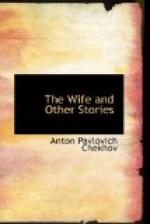“At times I used to walk about our seminary garden...” I would tell her. “If from some faraway tavern the wind floated sounds of a song and the squeaking of an accordion, or a sledge with bells dashed by the garden-fence, it was quite enough to send a rush of happiness, filling not only my heart, but even my stomach, my legs, my arms.... I would listen to the accordion or the bells dying away in the distance and imagine myself a doctor, and paint pictures, one better than another. And here, as you see, my dreams have come true. I have had more than I dared to dream of. For thirty years I have been the favourite professor, I have had splendid comrades, I have enjoyed fame and honour. I have loved, married from passionate love, have had children. In fact, looking back upon it, I see my whole life as a fine composition arranged with talent. Now all that is left to me is not to spoil the end. For that I must die like a man. If death is really a thing to dread, I must meet it as a teacher, a man of science, and a citizen of a Christian country ought to meet it, with courage and untroubled soul. But I am spoiling the end; I am sinking, I fly to you, I beg for help, and you tell me ‘Sink; that is what you ought to do.’”
But here there comes a ring at the front-door. Katya and I recognize it, and say:
“It must be Mihail Fyodorovitch.”
And a minute later my colleague, the philologist Mihail Fyodorovitch, a tall, well-built man of fifty, clean-shaven, with thick grey hair and black eyebrows, walks in. He is a good-natured man and an excellent comrade. He comes of a fortunate and talented old noble family which has played a prominent part in the history of literature and enlightenment. He is himself intelligent, talented, and very highly educated, but has his oddities. To a certain extent we are all odd and all queer fish, but in his oddities there is something exceptional, apt to cause anxiety among his acquaintances. I know a good many people for whom his oddities completely obscure his good qualities.
Coming in to us, he slowly takes off his gloves and says in his velvety bass:
“Good-evening. Are you having tea? That’s just right. It’s diabolically cold.”
Then he sits down to the table, takes a glass, and at once begins talking. What is most characteristic in his manner of talking is the continually jesting tone, a sort of mixture of philosophy and drollery as in Shakespeare’s gravediggers. He is always talking about serious things, but he never speaks seriously. His judgments are always harsh and railing, but, thanks to his soft, even, jesting tone, the harshness and abuse do not jar upon the ear, and one soon grows used to them. Every evening he brings with him five or six anecdotes from the University, and he usually begins with them when he sits down to table.
“Oh, Lord!” he sighs, twitching his black eyebrows ironically. “What comic people there are in the world!”




